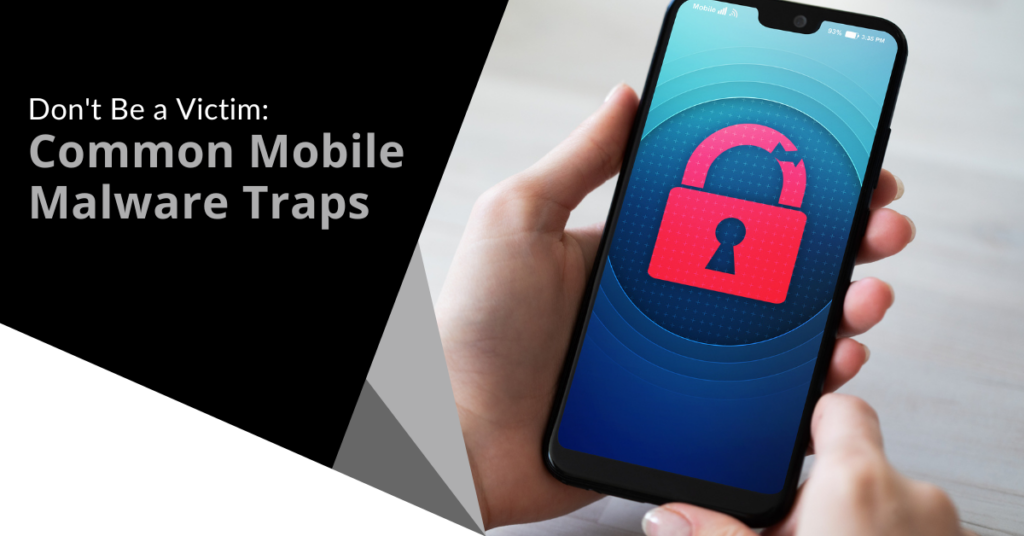|
Getting your Trinity Audio player ready...
|

In today’s digital age, your smartphone is more than just a communication tool—it’s a digital wallet and personal assistant all in one. Given the vast amount of sensitive information it holds, such as financial details and personal photos, it’s a prime target for cybercriminals.
Mobile device security is often overlooked, with most people focusing on securing their laptops and desktops. However, mobile devices are increasingly under attack, with a 50% rise in mobile cyber threats reported in 2023.
Hackers have not ignored smartphones. In fact, they have set numerous traps to compromise users’ devices with malware. Below, we’ll explore the most common mobile malware traps and provide actionable tips on how to safeguard your device.
Mobile Malware Threats You Should Know
Mobile malware operates much like the malicious software that targets computers. It can infiltrate your phone through deceptive apps, dangerous links, or even unsecured Wi-Fi connections, aiming to steal your data or harm your device. Being aware of these threats is the first step in staying safe.
1. Phishing Scams
Phishing attacks are among the most widespread mobile threats. Cybercriminals disguise malicious messages as legitimate emails or texts, often posing as trusted companies. Clicking on suspicious links or downloading attachments can install malware on your device.
2. Rogue Applications
Not all mobile apps are trustworthy. Some contain hidden malware designed to steal your data, bombard you with ads, or even take control of your device. Always investigate an app before installing it.
3. SMS-Based Scams
Smishing (SMS phishing) uses deceptive text messages to trick users into clicking malicious links or providing personal information. Be extra cautious when receiving unexpected messages that ask for sensitive details.
4. Public Wi-Fi Vulnerabilities
Connecting to unsecured public Wi-Fi networks can expose your device to cyber threats. Always avoid using public Wi-Fi for sensitive activities like online banking or shopping.
5. Counterfeit Apps
Imitation apps pose as popular applications but are actually loaded with malware. These fake apps can steal login credentials, financial details, or even hijack your phone.
6. Adware
While adware may seem less dangerous than other malware, it can still expose your device to further risks. It is often bundled with other apps and can result in excessive ads, leading to a less secure device.
How to Protect Your Mobile Device From Malware
Stay Updated
Make sure your phone’s operating system and apps are always up to date. Security patches are critical in protecting your device from known vulnerabilities.
Avoid Suspicious Links and Attachments It Might be Malware
Never click on links or download files from unknown senders. Doing so can expose your phone to malware.
Use Strong Passwords To Protect From Malware
Strengthen your phone’s security by using complex, unique passwords. A password manager can help you keep track of them.
Download Apps from Trusted Sources
Stick to downloading apps from official app stores like Google Play or Apple’s App Store. Before installation, read reviews and check the app’s permissions.
Secure Public Wi-Fi Usage To Keep Malware Away
When using public Wi-Fi, protect your data by utilizing a VPN to encrypt your connection.
Back Up Your Data Regularly
Regularly backing up your phone ensures that, in case of a security breach, you won’t lose important data. You can back up your phone through cloud services or directly to your computer.
Install Mobile Malware Security Software
A reputable mobile security app can provide an added layer of defense against threats.
Additional Security Measures for Your Smartphone
Physical Security
Set up strong security on your device, such as a complex passcode, fingerprint, or facial recognition. If your phone is lost or stolen, being able to remotely wipe the data is crucial to protect your sensitive information.
Be Cautious with Public Charging Stations
Avoid charging your phone using public USB charging stations. These can be compromised by hackers who may gain access to your device.
Review App Permissions
When downloading apps, carefully check the permissions they require. Deny any that seem unnecessary, as these could lead to data breaches. Conduct regular audits of your installed apps and remove any you no longer use.
Backup Your Data To Mitigate Risk of Malware
Utilize both cloud and local backups to safeguard your information. This ensures you have copies of your critical data in case of loss, theft, or damage.
Take Control of Your Mobile Malware Security
By following these proactive steps, you can significantly enhance your smartphone’s security. The more informed and vigilant you are, the better protected your data will be. Mobile technology offers incredible convenience, but without the proper safeguards, it can also pose serious risks.
Ensure that your mobile devices are secure, both for your personal use and to protect any sensitive work-related data.
Need Expert Help?
Mobile malware doesn’t just affect individuals—it can compromise entire business networks, especially if employees use personal devices for work. Be proactive in securing your mobile environment. Contact us today to learn more about our mobile device security solutions and how we can help you safeguard your data.
Twintel has grown into an expansive, full team of IT services professionals, acting as the outsourced IT department of non-profits, small to mid-size businesses, and enterprise-level corporations in Orange County, across California, and nationally.
Today, it’s the strength and deep expertise of the Twintel team that drives positive outcomes for clients. Each of the support staff, technicians, and engineers works diligently each day to make sure that the companies served have the seamless, secure, and stable IT environments needed to allow them to pursue their organizational objectives.